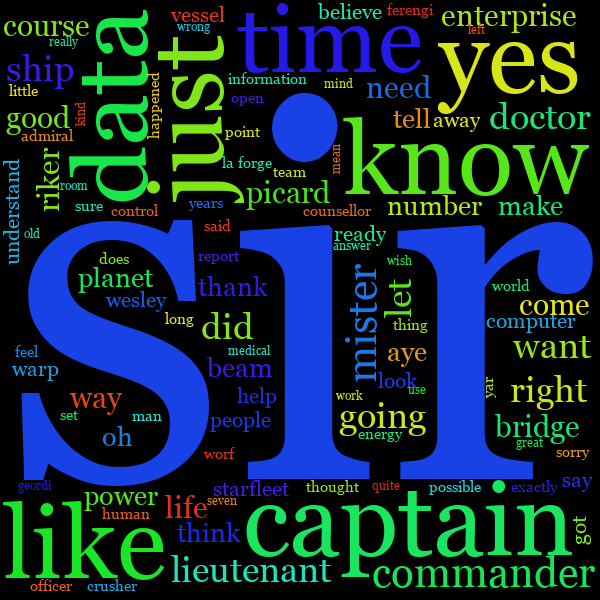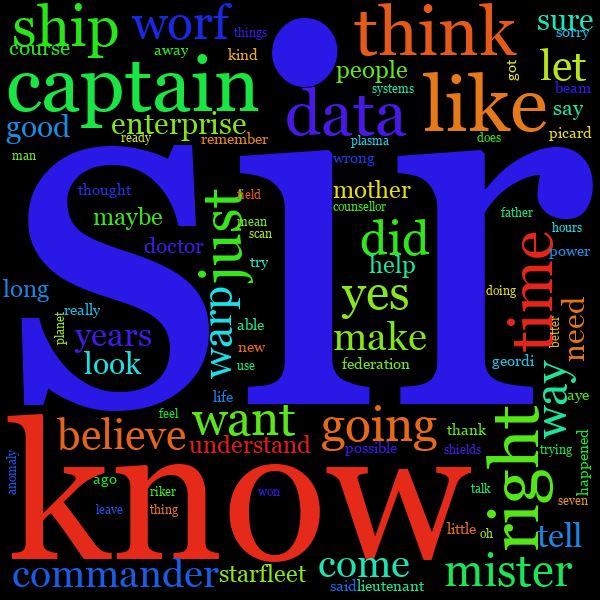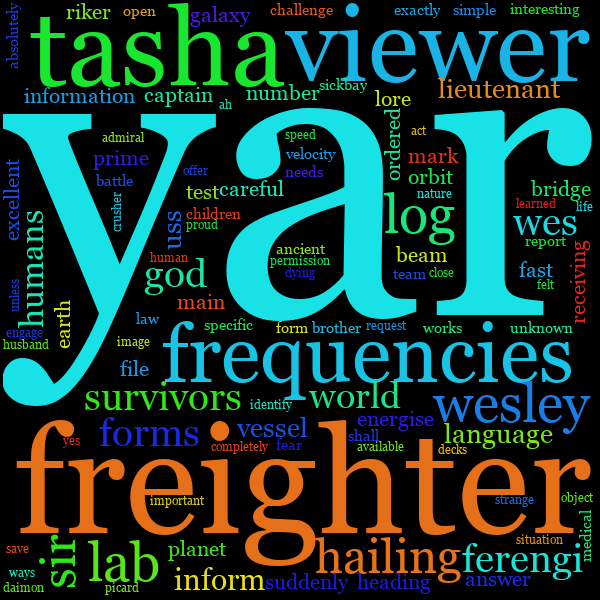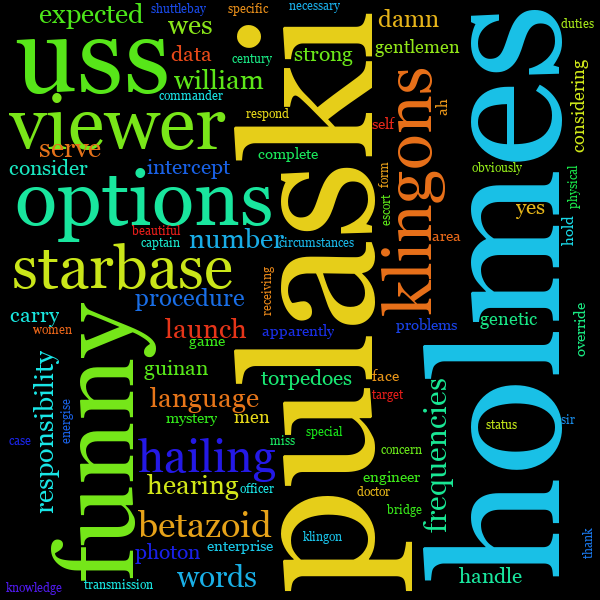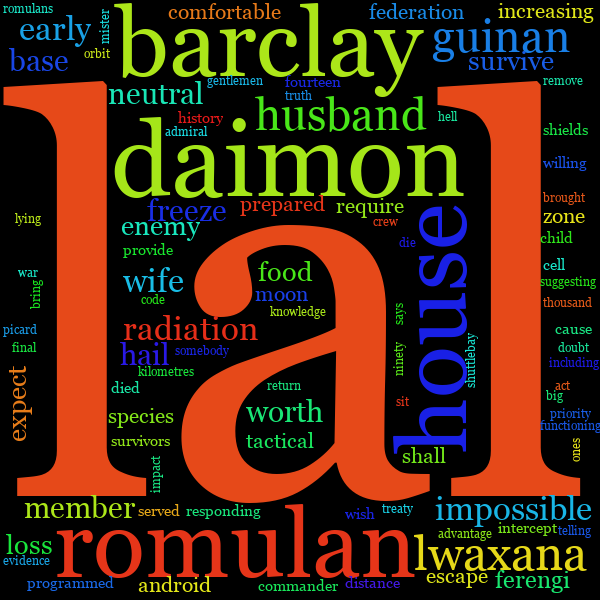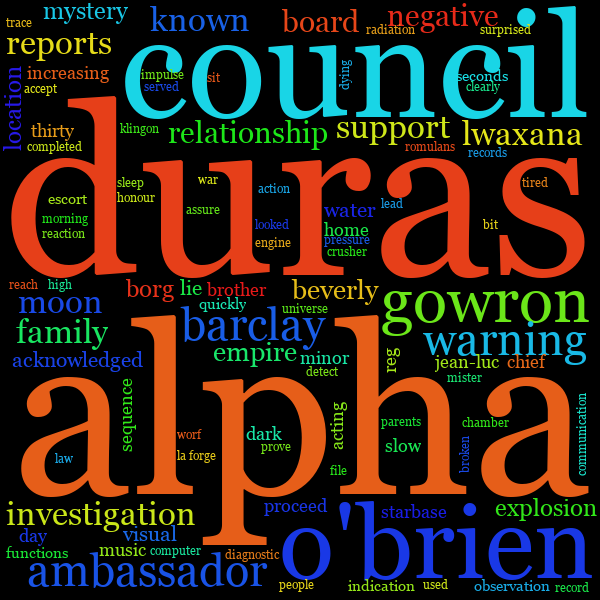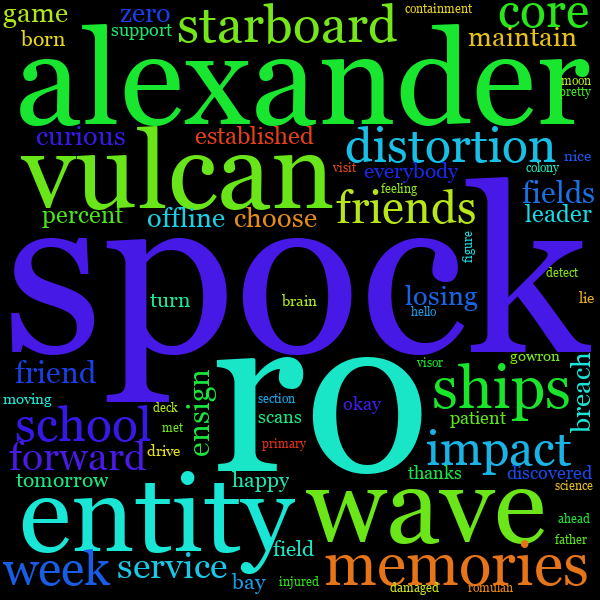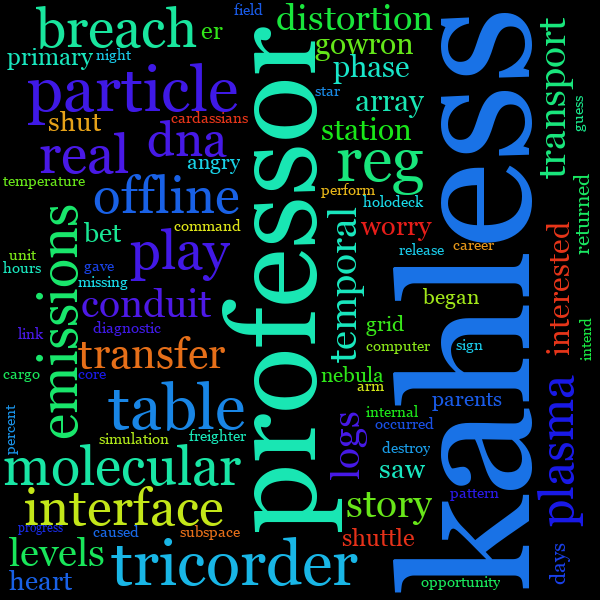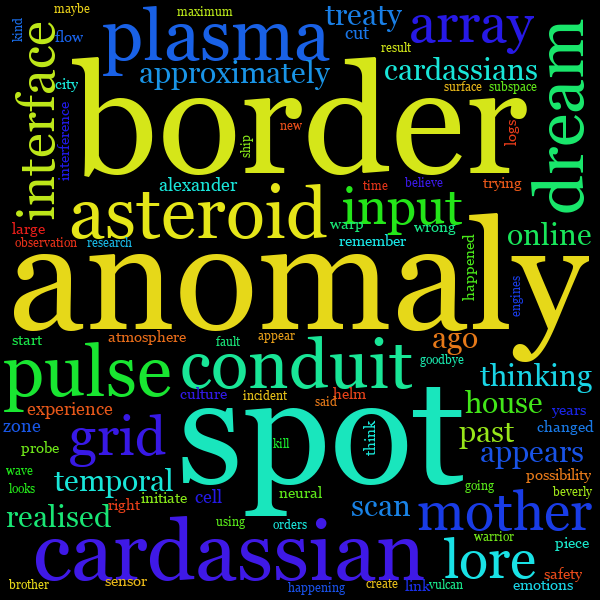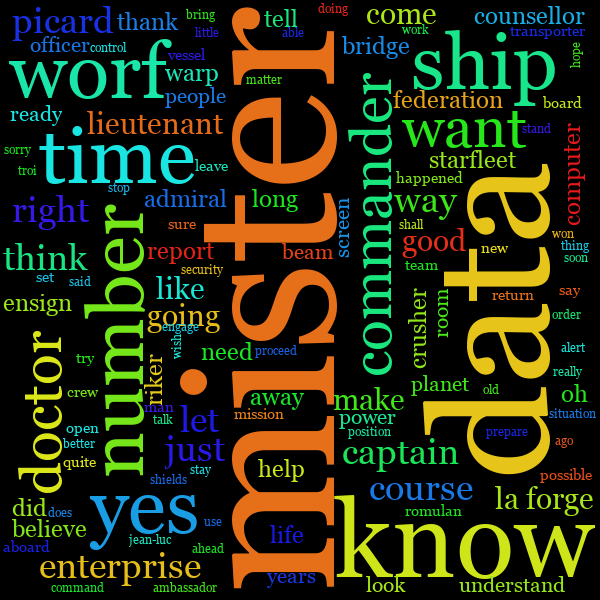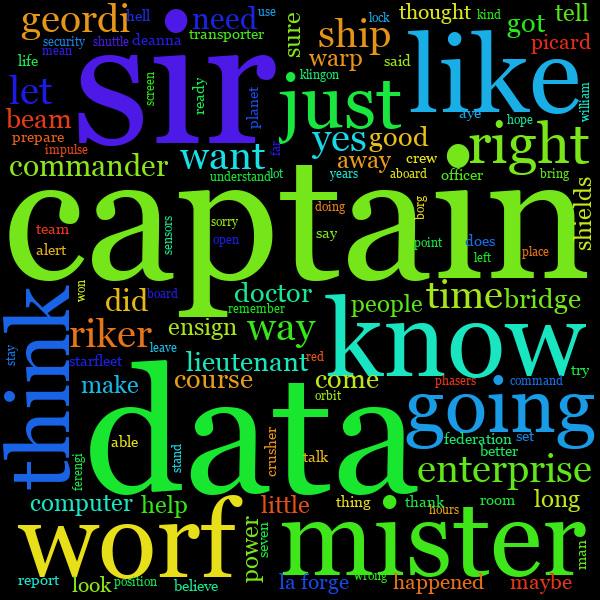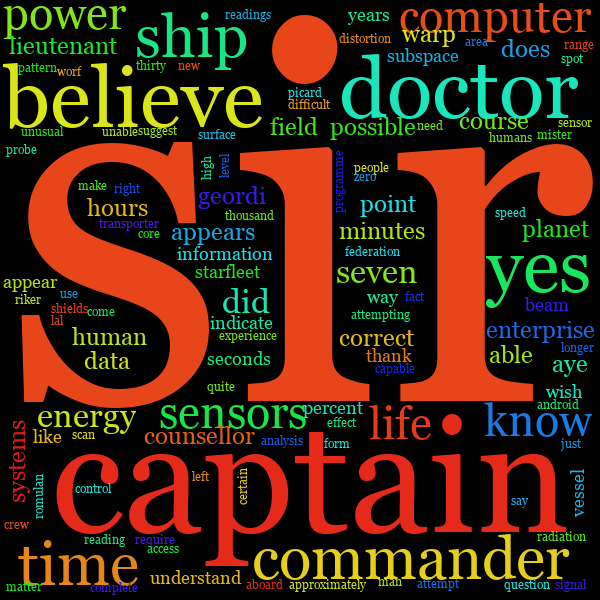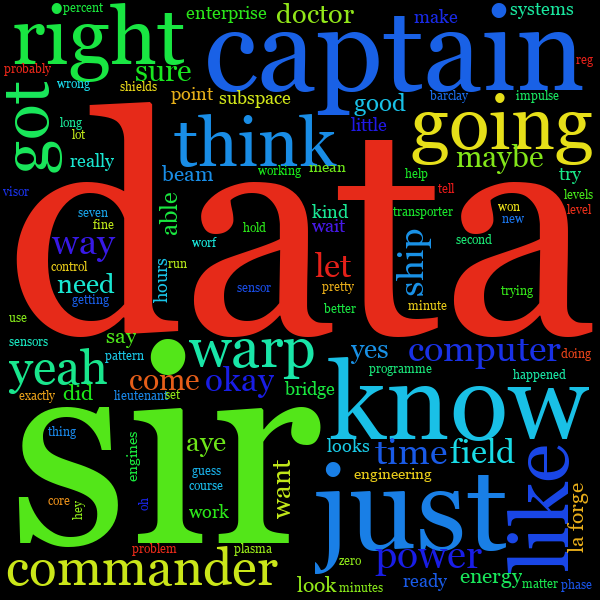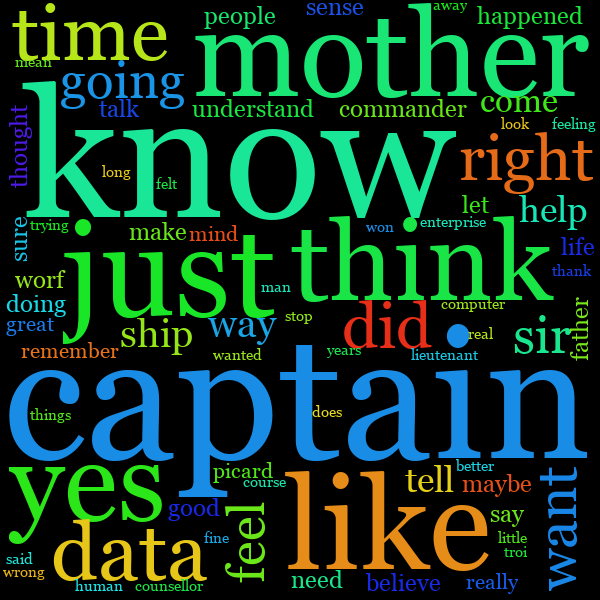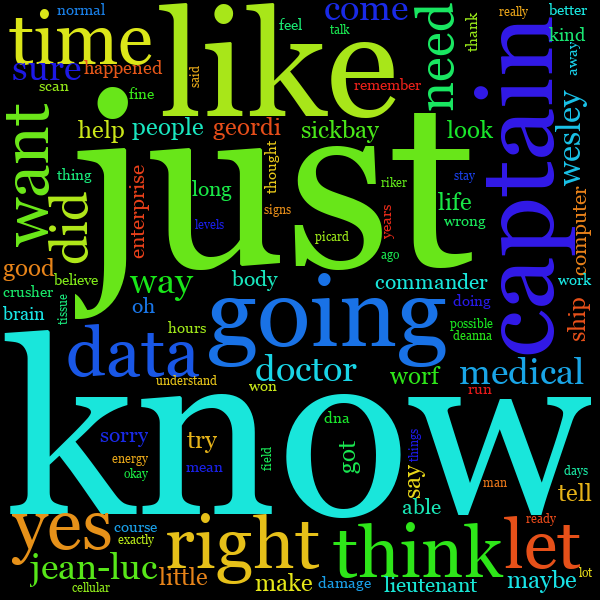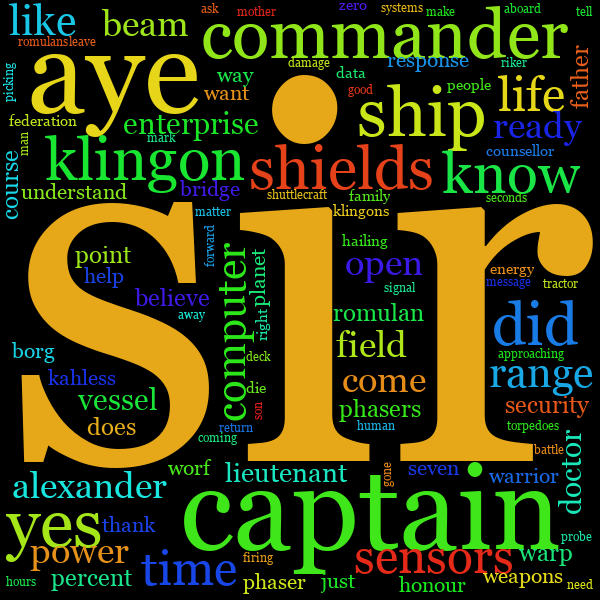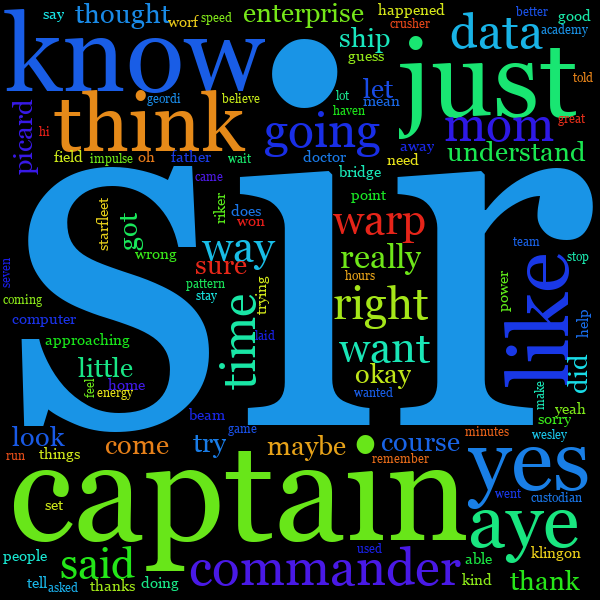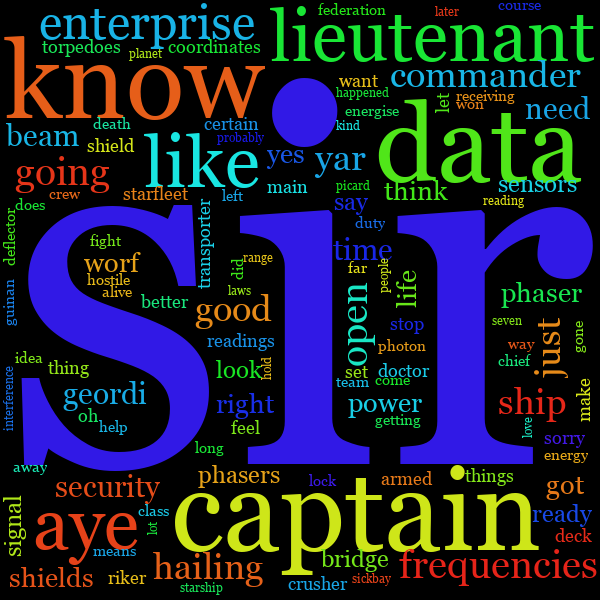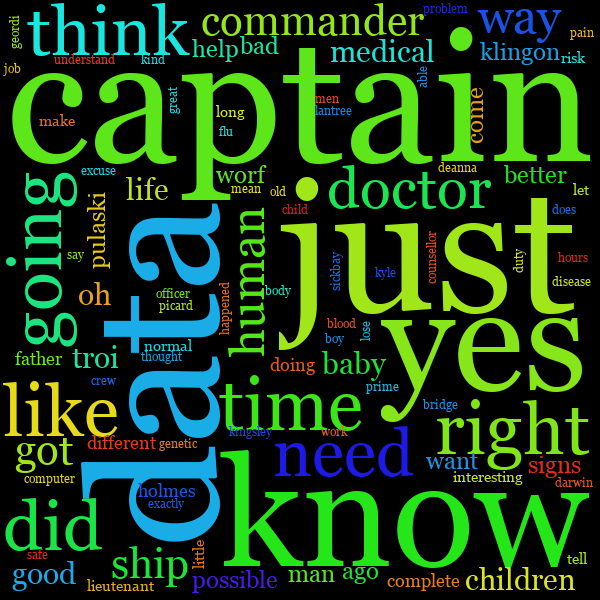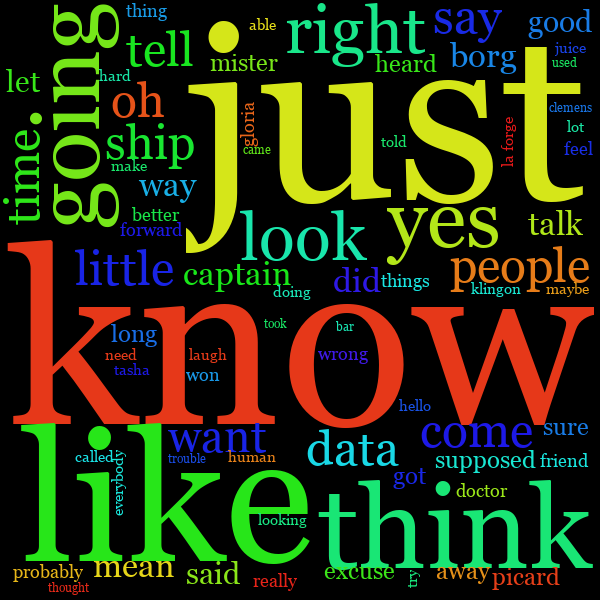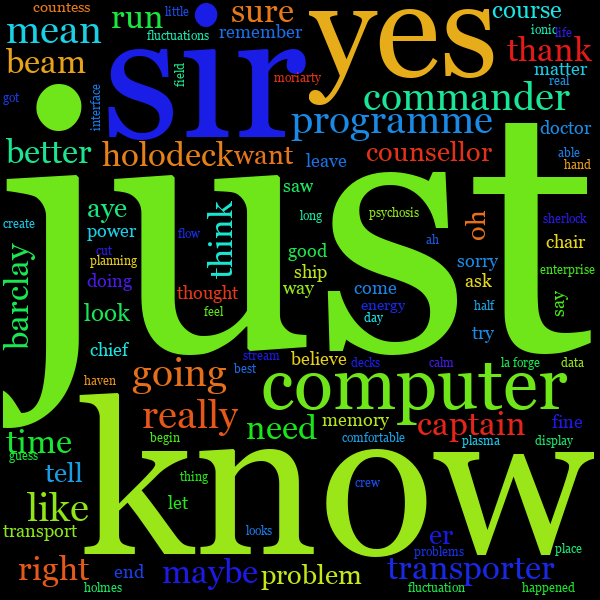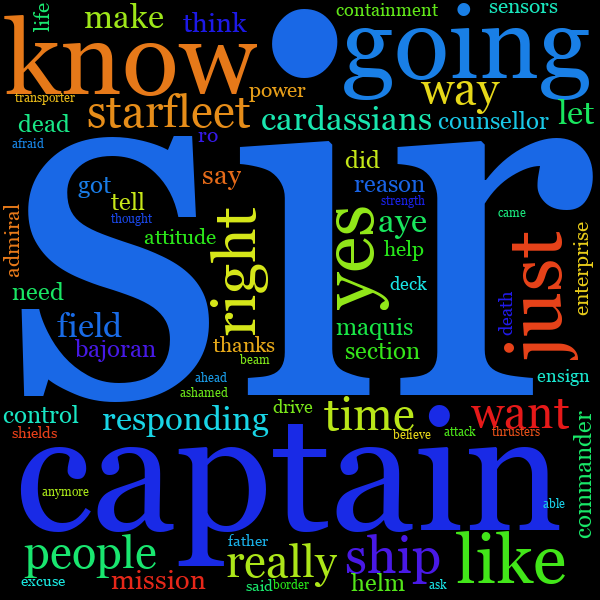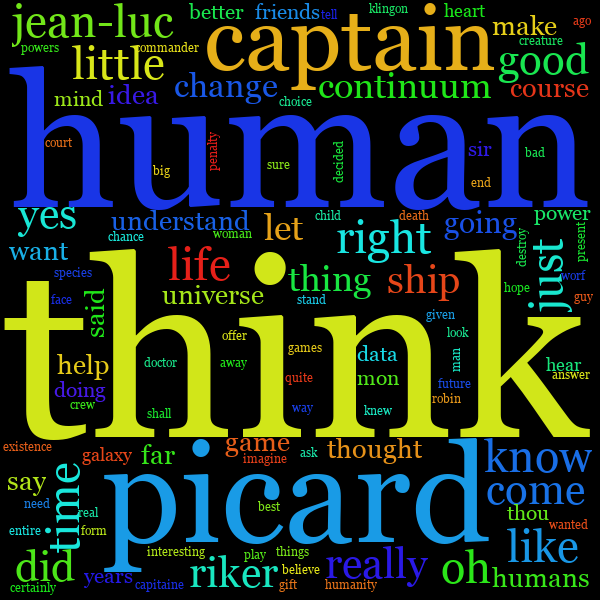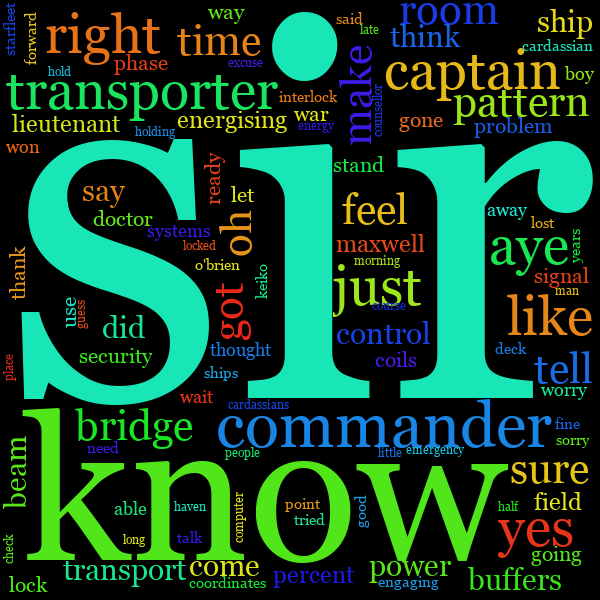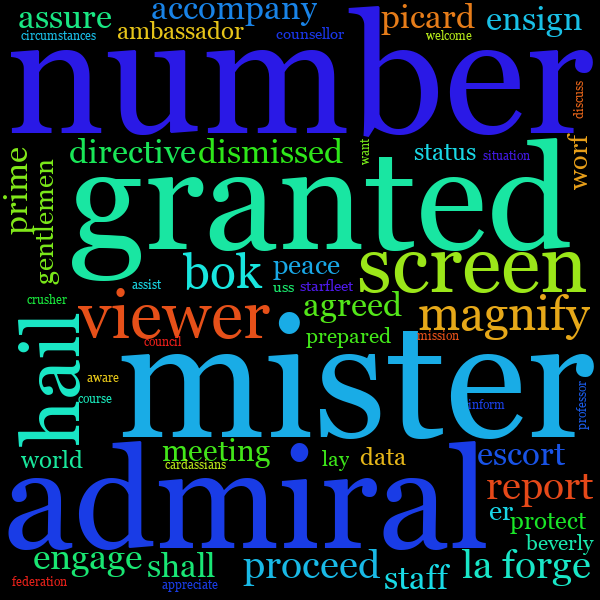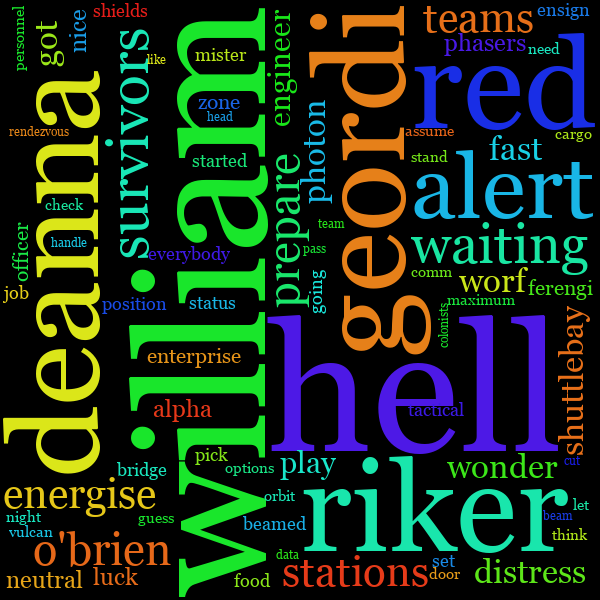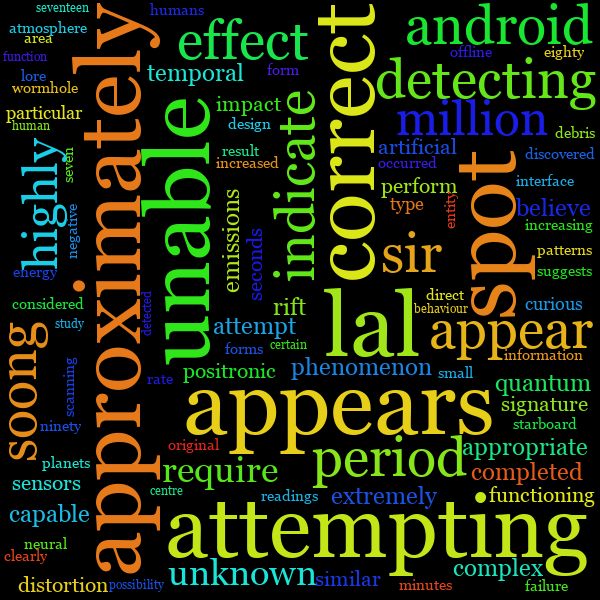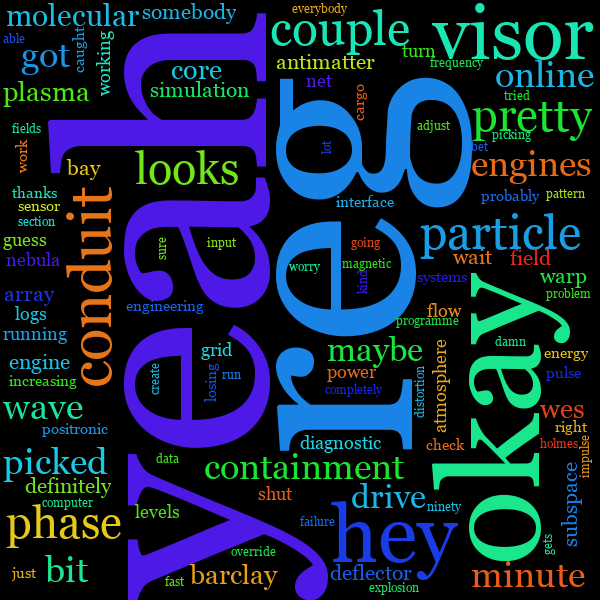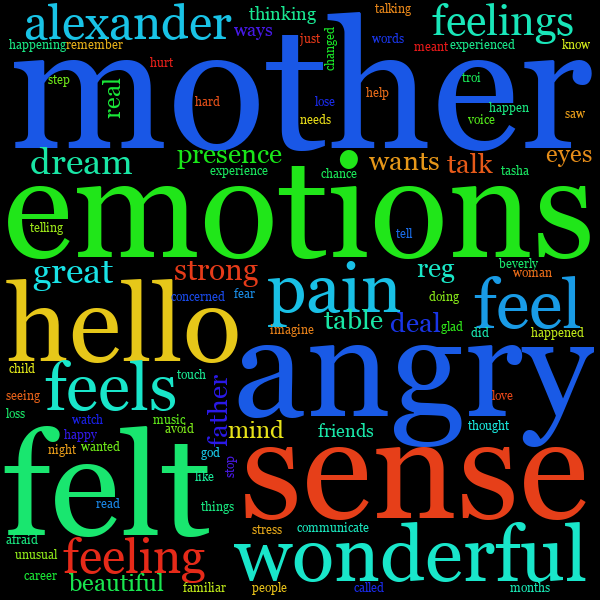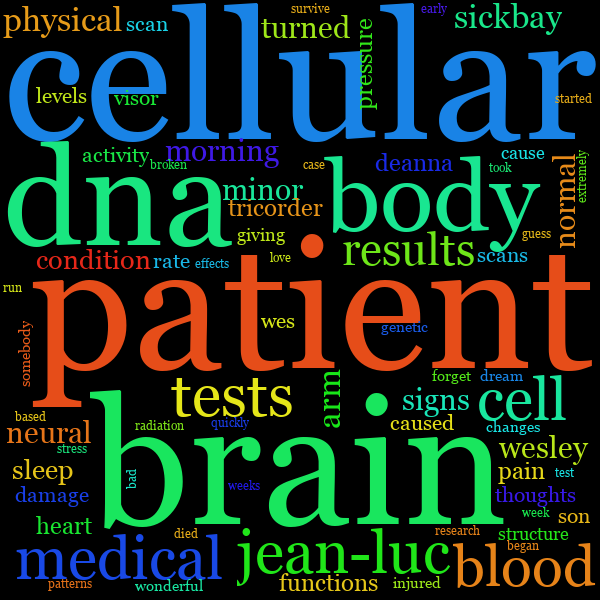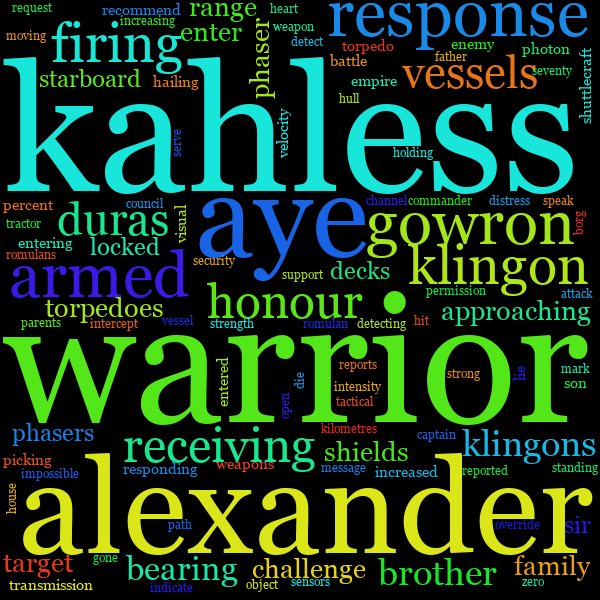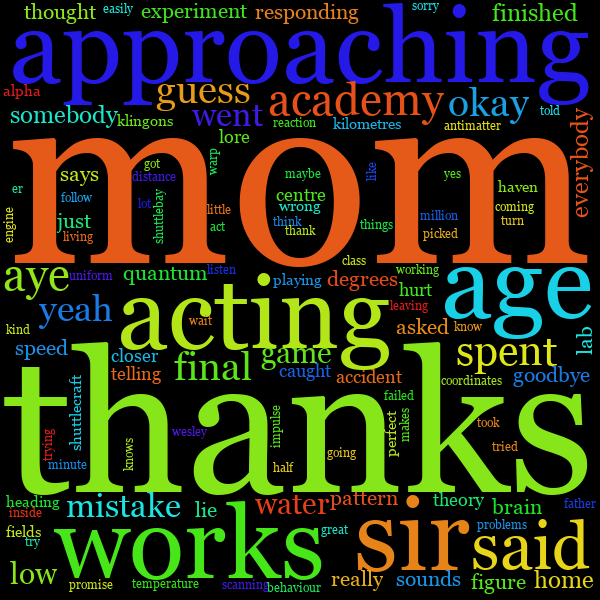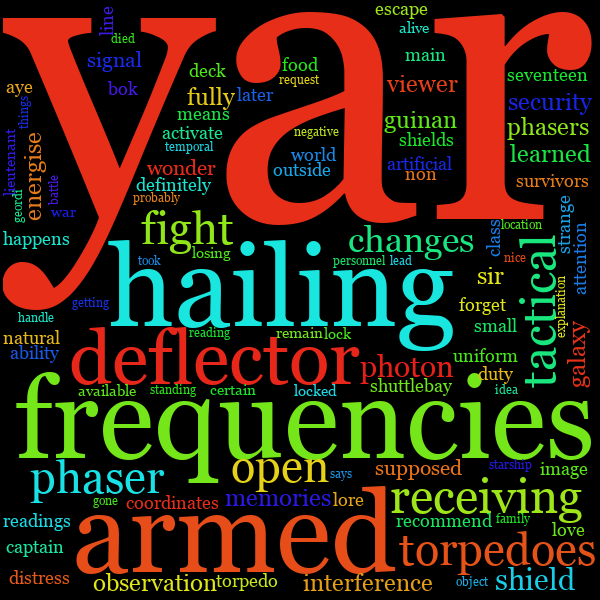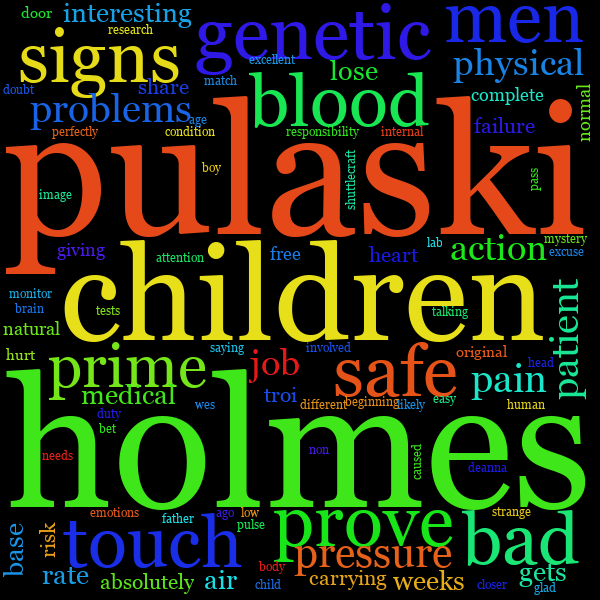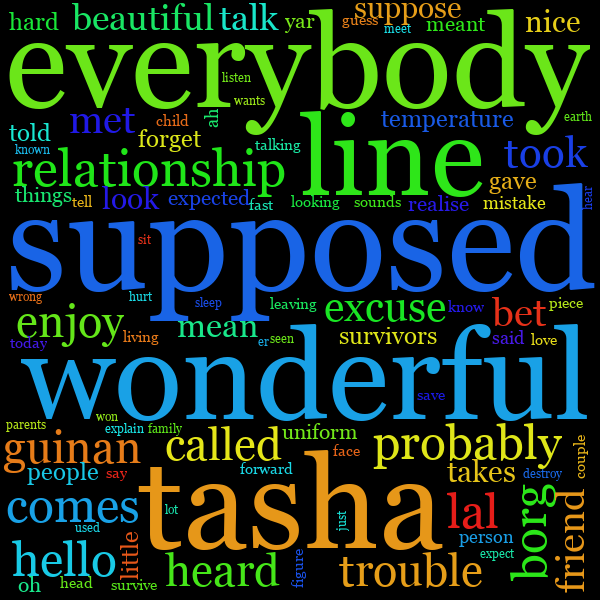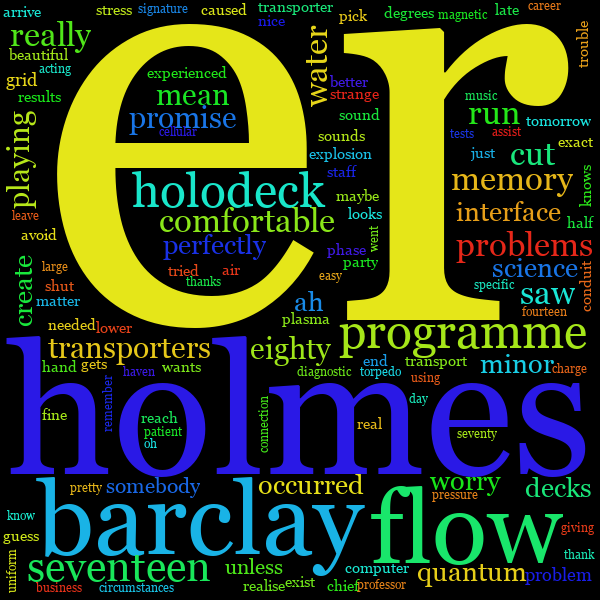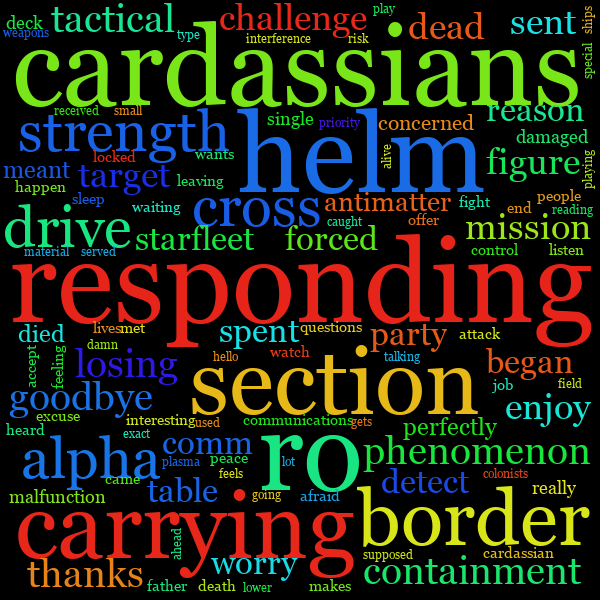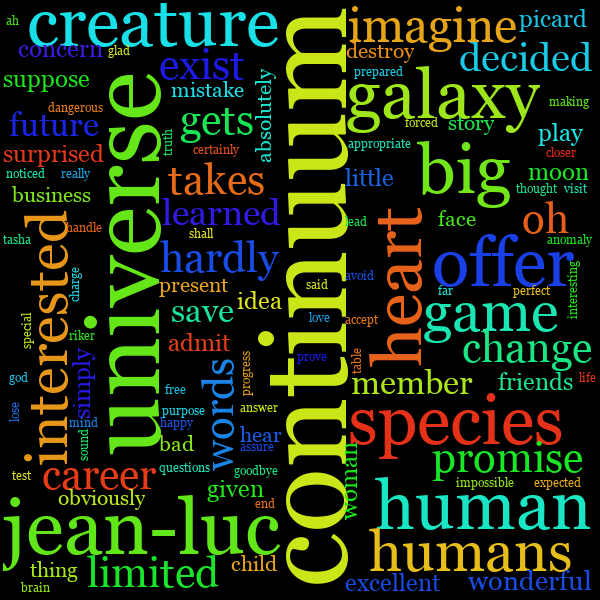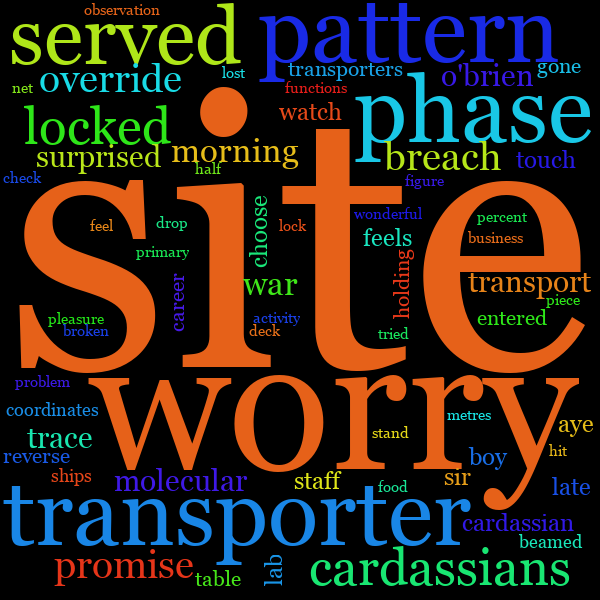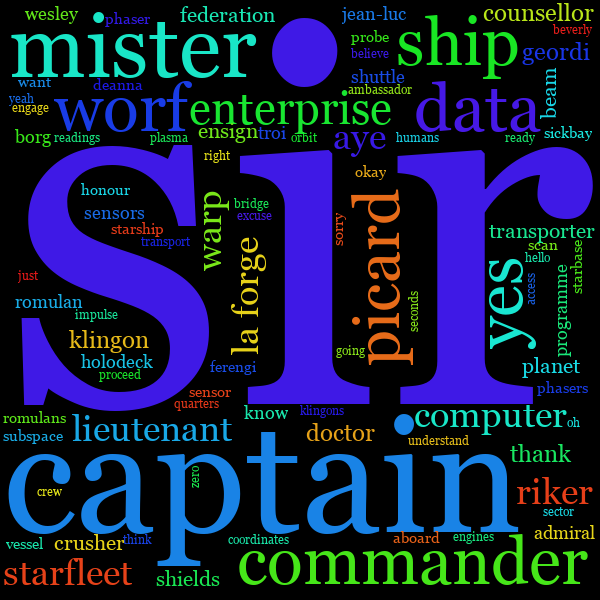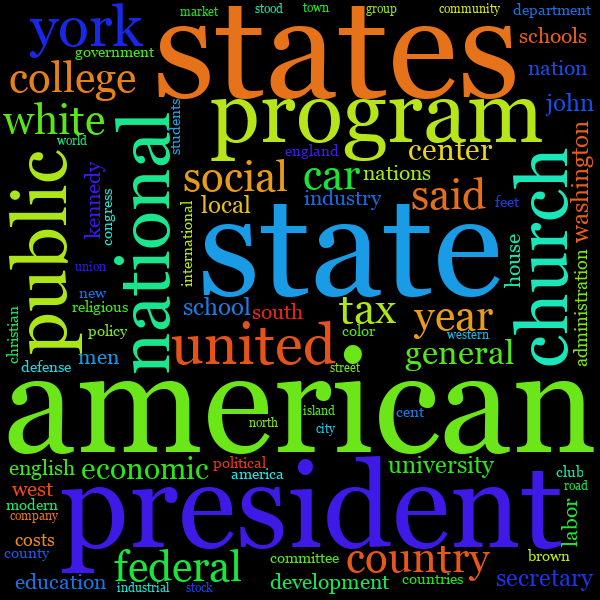Exploring Star Trek: The Next Generation with some word clouds
Introduction
I conducted a simple and fun exploration of the television show Star Trek: The Next Generation (TNG). I used transcripts of the show and made word clouds for each season and character. (I got the transcripts from the excellent Chrissie's Transcripts Site.)
As it turns out, the usual word clouds ranked by frequency don't clearly distinguish between seasons or between characters (everybody says "sir" all the time), so I created a type of relative word cloud that rewards words that appear in a given season (or are said by a given character) more than other seasons (or more than other characters).
In parsing transcripts, for the most part I considered a word to be a string of two or more alphabetical characters. There were three exceptions: "jean-luc," "o'brien," and "la forge" are all words, since these are all names of prominent characters on the show. I eliminated stop words (words that are extremely frequent in the English language, like "the").
Absolute word clouds by season
Here are word clouds displaying the most common words in each season of TNG.
Absolute word clouds by season - the clouds
So far, nothing really stands out. They all look pretty similar. There sure is a lot of "sir" and "captain" on Star Trek. Also, "data", "know", and "just." Maybe it's mildly interesting that in seasons 3 and 6 "sir" doesn't completely dominate the cloud.
Relative word clouds by season
In order to more clearly characterize the differences between the seasons, I generated a new set of what I'll call relative word clouds. These are not ranked by simple word frequency. The ranking here is by a statistic I made up which I'll call modified frequency relative to total frequency, and denote by MFRTF. That is, for each season and each word \(w\) among the 1000 most common words (other than stop words) on the show, we have
\[\textrm{MFRTF}_w = \frac{N_w^{1.1}}{T_w} , \]
where \(N_w\) is the number of times \(w\) appears in this season, and \(T_w\) is the number of times \(w\) appears in the series as a whole.
This way words are highly ranked for a given season if they appear more often in that season compared to other seasons. Moreover, due to the power 1.1, words are ranked more highly if they appear more often (otherwise, if two words appear only in Season 2, one twice and the other 20 times, they would both be ranked equally).
I limit the search to the 1000 most common words (after eliminating stop words) to avoid very rare words being highly ranked just because they only appeared in one season.
I give no theoretical justification for this choice of statistic. I simply experimented with a few different statistics and chose this one because it is easy to understand and produces good results for these word clouds. Many other statistics, including the commonly used term frequency-inverse document frequency produce results which still do not clearly distinguish between the seasons. (Note that tf-idf also has no theoretical justification. It's just a statistic people have found to be useful.)
Here we have the new word clouds.
Relative word clouds by season - the clouds
As you can see, these word clouds much more clearly distinguish between the seasons. I'll comment on a few of the prominent words (which will probably be easily recognizable to most TNG fans). Tasha Yar is a character who appears only in Season 1. Pulaski is a character who appears only in Season 2. The Season 2 episode "Elementary, Dear Data" features the character Data role playing as Sherlock Holmes. Lal is a character who appears only in Season 3. Daimon is a rank among the Ferengi. Reginald Barclay is a supporting character who appears in some seasons but not others. Ditto Ro Laren. Spock from the original Star Trek appears in one Season 5 episode. Two professors appear in Season 6: Moriarty and Galen. Kahless is the Klingon Jesus. Spot is Data's cat.
Absolute word clouds by character
Now I present absolute word clouds as spoken by each character. I've included all the main characters as well as five supporting characters.
Absolute word clouds by character - the clouds
As with the absolute word clouds for seasons, there's nothing earth-shattering here. All the Starfleet officers except Picard and Crusher say "sir" and/or "captain" all the time. Geordi La Forge and Data are friends, so it makes sense that Geordi says "data" a lot. But Data doesn't say "Geordi" nearly as often.
Relative word clouds by character
Now I'll give the relative per-character word clouds. These are ranked using the same statistic as the relative per-season clouds: MFRTF.
Relative word clouds by character - the clouds
These seem much more interesting and distinct. There's a lot here that I find pretty funny. Riker's own name William dominates his cloud. Troi's cloud prominently features "mother," "emotions," "felt," "angry," "sense," and "pain" (she's the therapist on the ship). Wesley's biggest words are "mom" and "thanks," which seems very appropriate. Prominent words for Geordi La Forge include "yeah," "okay," and "hey." The greatest thing is that the most prominent word in Barclay's cloud is "er" (he's always nervous and unsure of himself). Although if you look closely, there's a little "er" in Picard's cloud too.
(By the way, "number" appears prominently in Picard's cloud because he calls his First Officer "Number One.")
Regardless of the funny bits, it really feels like each cloud is a peek into the mind of the character. Beverly Crusher's got all kinds of medical and biological terminology floating around (and "wes" is in there too); Worf's thinking about Kahless and various weapons and his son Alexander; Q is thinking about the universe, the galaxy, the continuum, and, of course, Jean-Luc.
TNG vs. the world
Finally, I wanted to get a sense of which words are TNG words and which are not. To that end, I did relative word clouds for TNG vs. the Brown corpus, a collection of English language documents compiled in the 1960s intended to be a representative sample of American English.
There's that "sir" again. Apparently the least Star Trek words include "state", "american," "president," and "church." That makes perfect sense as Trek takes place in the far future, where national divisions (and human religion) are a thing of the past.
Conclusion and future projects
I think the relative word clouds really distinguish the various seasons and characters. Someone could object though that they don't necessarily characterize the seasons and characters.
For instance, Lal appears in one episode of Season 3, and yet her name dominates the relative word cloud for Season 3. Of course this is because her name never appears in any other season. Maybe a metric other than MFRTF could rank words higher if they appear in many episodes of a season.
If we want to think of the character relative word clouds as "a peek into their minds," as I mentioned above, we can see a few imperfections. For instance, the name "deanna" appears prominently in Riker's relative word cloud (Deanna Troi is Will Riker's close friend and former lover), but the name "will" does not appear in Troi's cloud. This is probably because several other characters call Riker Will, but most people call Troi by her last name -- including her friend Beverly Crusher. Thus the MFRTF metric rewards Riker's Deanna because nobody else says that, but doesn't reward Deanna's Will. It's not immediately clear how to address that problem.
An obvious related project, which I'll probably tackle at some point, is to repeat this project with another Star Trek series (Deep Space Nine maybe?). Or hey, why not go crazy and do a series other than Star Trek?
I've also played with the idea of implementing a machine learning predictor that guesses which season of TNG a given scene came from. This sounds fun but it's not clear whether it could work well enough to be worthwhile. And to the extent it did work, maybe the best algorithm wouldn't amount to much more than looking for one of a handful of key words in a scene: "Pulaski" means Season 2, "Lal" means Season 3, and so on.
